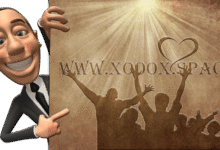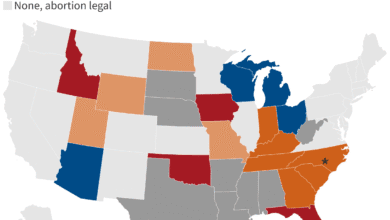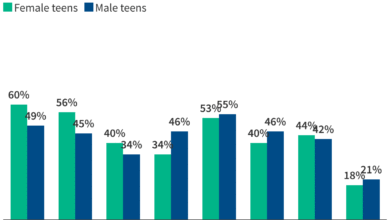KFF/The Washington Post poll of parents: Exposure to and trust in children’s online health information

KFF/The Washington Post poll of parents: Exposure to and trust in children’s online health information
By kffisabellev | Published: 2025-10-22 15:00:00 | Source: KFF
As debates continue over the safety of childhood vaccines and trust in public health guidance in the United States, findings from the latest KFF/Washington Post parent survey reveal how parents encounter health information on social media and how it can shape their decisions. A third of parents (34%) say they have seen content on social media related to children’s vaccines, and about three in ten report seeing content related to children’s health on social media weekly or daily (29%). Notably, many parents find it difficult to determine whether the health-related information they see online is trustworthy (38%), and a few say there is a particular influencer they trust when it comes to information about children’s health (15%). Regardless, only a small percentage of parents say information about children’s vaccines on social media impacts them, with 4% saying it made vaccine decisions easier for their children, and another 4% saying it made those decisions more difficult.
Parental exposure to content related to children’s health
Many parents report seeing content on social media related to children’s health, even if they are not actively searching for it. About eight in ten (79%) parents say they see information or advice about children’s health at least sometimes, compared to just one in five (21%) who say they never see this content. About three in ten (29%) parents say they see information or advice about children’s health on social media daily (11%) or weekly (18%). About one in ten reported seeing this content about once a month (12%), and about four in ten reported seeing it occasionally (38%).
Compared to their counterparts, larger shares of parents under 35 (36%), mothers (35%), Black parents (33%), Hispanic parents (36%), and Democratic parents (33%) say they see this content at least weekly, even if they aren’t looking for it.
Do parents trust influencers when it comes to general health and wellness advice?
Some of the health-related content shared on social media comes from influencers, individuals who have large social media followings and often post about issues of concern. While some social media users follow specific influencers, others may be exposed to posts from influencers they do not follow, as algorithms promote content that is likely to interest them. with Recent moves from major technology companies To eliminate third-party verification, assessing the authenticity of this content can be difficult.
A KFF/Washington Post survey of parents shows that many parents have a hard time knowing what to trust when it comes to health content shared by influencers. While around a third (35%) of parents say it is “very easy” or “fairly easy” to know which advice to trust when it comes from health and wellness influencers they see on social media, around four in ten (38%) say it is “somewhat difficult” or “very difficult”. This includes between a third and four in ten parents across gender, age, race, ethnicity and party affiliation who say it is. At the very least, it is “somewhat difficult” to know whether the advice of influential people is trustworthy.
Around one in seven (15%) parents say there is a particular influencer they trust when it comes to information and advice about children’s health, although only 4% can name the influencer while one in eight (12%) say they cannot remember the name of the influencer. Nearly eight in ten (84%) parents say there is no particular social media influencer they trust when it comes to information and advice about children’s health (58%) or that they do not see content from health and wellness influencers (27%).
Of the few parents who were able to name an influencer they trust (4%), names mentioned include a variety of individuals and social media accounts. Very few influencers were mentioned by more than one parent who responded to the survey, suggesting that the health information parents obtain from influencers represents a wide range of quality and perspectives. While some of the influencers mentioned (including “Dr. Beachgem10” and “Dr. Lauren Hughes”) appear from their profiles to be practicing doctors, many others are celebrities or other figures without medical credentials.
The proportion of parents who say they have a particular influencer they trust most when it comes to information and advice about children’s health varies by age, race, ethnicity, and vaccine decisions. Younger parents (21%), Black parents (21%), and Hispanic parents (18%) are more likely than their counterparts to say there is an influencer they trust, although fewer can name a specific influencer. Parents who reported skipping or delaying a vaccine for their children were also more likely than those who kept their children up to date on vaccines to say there was an influencer they trusted for advice on children’s health (20% vs. 14%), although few in either group could name the influencer. Similar shares of Make America Healthy Again (MAHA) supporters (15%) and non-MAHA supporters (15%) also say this.
When asked which is closest to their view, about eight in ten (84%) parents say health influencers are mostly motivated by “financial interests” while 15% say they are mostly motivated by “serving the public interest.” (26% and 19% respectively) – the same groups most likely to say there is a specific influencer they trust when it comes to information and advice about children’s health.
Content related to childhood vaccines on social media
Childhood vaccine recommendations have been a recurring topic of news coverage since the appointment of Secretary of Health and Human Services Kennedy, including… Changes And the verbs in state and Federalism Levels. These changes may leave parents with questions, and some may turn to social media for advice.
A KFF/Washington Post poll of parents found that a third (34%) of parents say they’ve seen information or advice about vaccines for children on social media. Notably, nearly half of parents (45%) who missed or delayed their children’s vaccines other than COVID-19 or influenza say they have seen content related to children’s vaccines online, compared to about a third (32%) of parents who kept their children up to date who say the same.
Compared with their counterparts, somewhat larger proportions of mothers (37%), fathers under age 35 (38%), and parents who support the MAHA movement (37%) say they have seen information online about childhood vaccines.
About one in five (19%) parents say they see vaccine content as a “mix” of both pro- and anti-vaccine, while fewer see content as “mostly pro-vaccine” (8%) or “mostly anti-vaccine” (7%). Notably, among parents who reported skipping or delaying vaccines for their children, similar shares say they mostly see anti-vaccine (12%) or pro-vaccine content (10%) online, and about one in four (24%) report seeing a mix of both.
Democratic parents are more likely to say they watch pro-vaccine content online than Republican parents (13% vs. 7%), while similar shares indicate seeing mostly anti-vaccine content (7% and 8%). About one in seven (15%) Democratic parents and one in five Republican and independent parents see content that is mostly a combination of both.
While MAHA supporters are slightly more likely to say they have seen content related to childhood vaccines online, similar shares of MAHA supporters and non-supporters overall say they see mostly pro-vaccine content or mostly anti-vaccine content.
With many parents reporting a lack of trust in health and wellness influencers, and amid the widespread confusion and uncertainty the public feels about what’s right online, a small number of parents say exposure to content related to children’s vaccines made it easier (4%) or harder (4%) to make vaccine decisions for their children. A quarter of parents (26%) say exposure to information about children’s vaccines on social media did not make making decisions about vaccinating their children easier or more difficult.
These shares are similar across parental age, partisanship, race, and ethnicity. Among parents who report skipping or delaying vaccines for their children, 9% say social media content made their decisions easier, 7% say it made it more difficult, and three in ten say it didn’t make much difference.
(tags for translation) Children
ــــــــــــــــــــــــــــــــــــــــــــــــــــــــــــــــــــــــــــــــــــــــــــــــــــــــــــــــ












